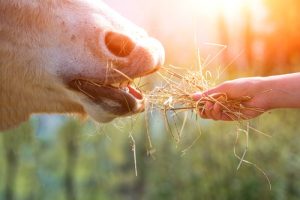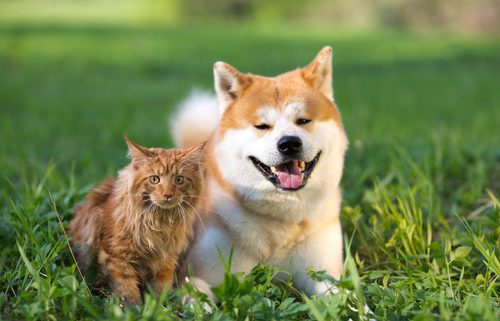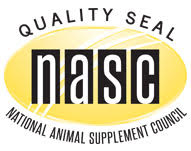Animals need dental care to avoid gum disease and prevent the spread of infection in the mouth. Animals who don’t get dental care can also lose their teeth prematurely and suffer from very bad breath. Whether you’re a pet owner or a horse owner, maintaining your animal friend’s teeth is important.
Dental Care for Dogs and Cats
As a pet owner, you can help your dog or cat maintain good oral hygiene by watching for signs of gum disease, brushing your pet’s teeth on a regular basis, and taking your pet to the veterinarian at least once annually for a dental exam and cleaning.
Signs of Gum Disease
When looking for signs of gum disease, watch for bleeding gums, extra salivation, difficulty chewing, spots on the teeth and gums, missing teeth, reluctance to eat hard foods or chew on hard chew toys. Your pet’s breath may also develop a very foul odor, which is a sign of bacteria in the mouth. If you notice that your pet has any of these symptoms take your pet to the veterinarian right away.
Toothbrushing
Cats and dogs both need to have their teeth brushed daily. When brushing your pet’s teeth, use a toothbrush or gauze wrapped around your finger. Always use toothpaste designed for the type of pet you own. Never use human toothpaste, because human toothpaste contains ingredients that can sicken your pet.
Allow your pet to sample toothpaste first, then put toothpaste on some gauze wrapped around your finger, and use the gauze to gently wipe a few of your pet’s teeth. Don’t worry about trying to clean all of your pet’s teeth when you’re first training your pet to accept toothbrushing. This can come later. Reward your pet with praise when you’re finished. Repeat this process several times over many days before trying to brush more teeth at once.
In addition to toothbrushing, there are several products on the market that may be good for your pet’s teeth.
- Dental chews: Dental chews are treats that are designed to break down plaque and help your pet maintain good dental health.
- Water additives: Water additives can break down plaque and freshen your pet’s breath, much like mouth wash.
- Teeth cleaning chew toys: Some chew toys can actually help clean your pet’s teeth and strengthen the gums.
Dental Care for Horses
Horses don’t need to have their teeth brushed every day like dogs and cats, but they do need to see the veterinarian for dental check ups once annually. Have your horse’s veterinarian check for abnormalities and make recommendations for treatment.
The best way to keep your horse’s teeth healthy is by allowing your horse to enjoy a high-forage diet. This stimulates the production of saliva that can help remove bacteria from the mouth and keep your horse’s teeth clean and healthy. Young horses are more likely to have healthy teeth than older horses, so as your horse ages, be sure to keep up with dental care from a veterinarian.
Join the National Animal Supplement Council
The National Animal Supplement Council is dedicated to the health and wellness of horses, cats and dogs. We’re always accepting new members! For more information about joining our organization, check out the levels of membership on our webpage.
The NASC Quality Seal
The goal of the National Animal Supplement Council (NASC) is to promote the health and well-being of companion animals and horses that are given animal health supplements by their owners, and to protect and enhance the integrity of the animal health product industry. When you see the NASC Quality Seal on animal health supplements, you can trust you are buying from a reputable company that has successfully completed an independent quality audit and has complied with rigorous requirements necessary to gain permission to display the Quality Seal. To learn more, and to access meaningful information on all aspects of health and wellness for dogs, cats and horses, visit AnimalHealthLive.com.


